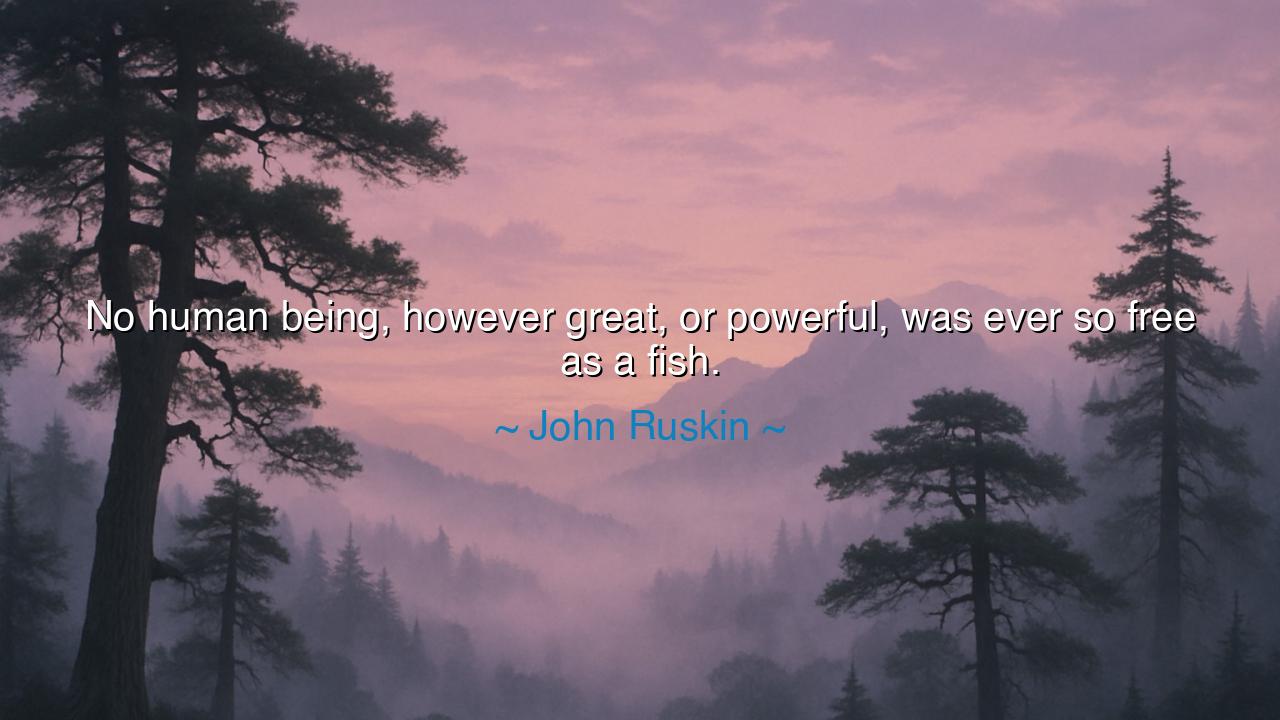
No human being, however great, or powerful, was ever so free as a






When John Ruskin declared, “No human being, however great, or powerful, was ever so free as a fish,” he spoke as one who had long studied the restless heart of man and the serene flow of nature. In those few words lies both lament and revelation — a comparison between the boundless freedom of the natural world and the self-made bondage of humankind. Ruskin, philosopher, critic, and prophet of beauty, saw that while man boasts of conquest and dominion, he is, in truth, chained by his own desires. The fish, gliding through the deep with effortless grace, knows no crown, no law, no pride — and thus, it is free.
In the centuries of industry and empire, when men sought to master earth, sea, and sky, Ruskin stood apart, warning that in their pursuit of power, they had forgotten the art of being. To be human is to dream, to build, to strive — yet in all our striving, we lose something pure and eternal. The fish moves as creation intended: unhindered, unhurried, in harmony with its world. It does not covet nor compare. It needs no fortress nor fortune. Its kingdom is movement; its throne, the open sea. Ruskin saw in it a symbol of the freedom that comes from simplicity, the peace that follows when one desires nothing beyond the rhythm of life itself.
The origin of Ruskin’s reflection can be found in his lifelong devotion to nature’s truth. He was a man who worshiped beauty — not the shallow kind that decorates, but the divine beauty that reveals the unity of all living things. He walked the mountains and rivers of England, sketching, writing, and observing how every leaf and ripple obeyed a quiet, perfect law. And in contrast, he saw the cities — gray, greedy, gasping for progress — where men, though powerful, were weary and imprisoned by their own ambitions. Thus he concluded that no king nor conqueror, no scholar nor saint, was ever as truly free as the creature that swims where it wills, unburdened by pride or possession.
Consider the tale of Diogenes the Cynic, that ancient philosopher who lived in poverty yet defied the might of kings. When Alexander the Great came to visit him and asked, “What can I do for you?” Diogenes replied, “Stand out of my sunlight.” In that moment, the emperor, with all his armies and wealth, seemed small beside the beggar who desired nothing. Diogenes, like Ruskin’s fish, was free because he had no need of chains disguised as comforts. His soul swam in its own ocean, beyond reach of fear or want. True liberty, both men knew, does not come from power — it comes from contentment and harmony with nature.
The wisdom hidden in Ruskin’s words is this: freedom is not the absence of limits, but the absence of longing. The fish, confined by the sea, is freer than man, who is confined by his desires. We, who claim to rule the world, are ruled by our own hungers — for wealth, for fame, for control. We build our cages with ambition and call them palaces. Yet the creatures of earth and water, who live as they were meant to live, know a joy and peace that our empires cannot buy. To watch them is to remember what we have lost — the art of being at one with the world rather than above it.
And so, my child, learn this lesson from the sea: seek not freedom in power, but in peace. Let your heart be like the fish — simple, silent, and unafraid to follow the current of life. Do not chase what the world calls success; instead, learn to move in harmony with your purpose. When you walk among men, carry within you the calm of the waters; when the storms of ambition rage, dive deep, where stillness reigns. For true freedom is not found in the heights of dominion but in the depths of understanding.
Remember, then, Ruskin’s eternal truth: No human being, however great, or powerful, was ever so free as a fish. Those who rule the world may command armies and nations, but the one who rules himself, who lives lightly and loves deeply, knows the freedom of the sea. Be that soul — serene, unattached, and alive to the present. Swim through life not as a captive of pride, but as a traveler of grace. For when the world’s noise fades and all ambitions turn to dust, it is the spirit that flows with nature — calm, pure, and free — that will remain forever unbound.






AAdministratorAdministrator
Welcome, honored guests. Please leave a comment, we will respond soon